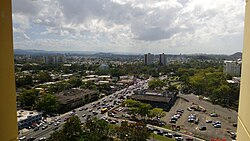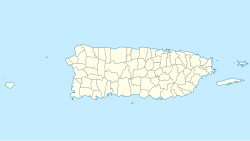Hato Rey Sur is one of the 18 barrios of the municipality of San Juan, Puerto Rico.[3] It is one of three barrios formerly known as Hato Rey. Hato Rey Sur was a barrio of the former municipality of Rio Piedras, before it was merged with the municipality of San Juan in 1951.[4] Following the annexation of Rio Piedras, the city of San Juan, and its surrounding area now including Rio Piedras, quadrupled its former size.[5]
Hato Rey Sur | |
|---|---|
 | |
| Coordinates: 18°24′17″N 66°03′31″W / 18.404758°N 66.058639°W[1] | |
| Commonwealth | |
| Municipality | |
| Area | |
• Total | 0.82 sq mi (2.1 km2) |
| • Land | 0.82 sq mi (2.1 km2) |
| • Water | 0 sq mi (0 km2) |
| Elevation | 33 ft (10 m) |
| Population (2020) | |
• Total | 8,863 |
| • Density | 11,000/sq mi (4,200/km2) |
| Source: 2020 Census | |
| Time zone | UTC−4 (AST) |
Demographics
edit| Census | Pop. | Note | %± |
|---|---|---|---|
| 1950 | 14,908 | — | |
| 1960 | 11,947 | −19.9% | |
| 1970 | 13,687 | 14.6% | |
| 1980 | 12,642 | −7.6% | |
| 1990 | 12,915 | 2.2% | |
| 2000 | 10,868 | −15.8% | |
| 2010 | 10,738 | −1.2% | |
| 2020 | 8,863 | −17.5% | |
| U.S. Decennial Census 1900 (N/A)[6] 1910-1930[7] 1930-1950[8] 1980-2000[9] 2010[10] | |||
In 2020, Hato Rey Sur had a population of 8,863 residents.[11]
Subbarrios
editThe barrio of Hato Rey Sur is further subdivided into four “subbarrios".[12]
Landmarks and places of interest
edit- EDP University, Hato Rey Campus
- Judicial Center of San Juan
- Universidad Avenue, the main nightlife and dining spot for students of the UPR.
- The University of Puerto Rico's main campus is also located closeby.
Transportation
editAlthough the only Tren Urbano station to be fully located within Hato Rey Sur is Piñero, the Rio Piedras and Universidad stations also serve the barrio due to their close proximity.
Gallery
edit-
El Monte Condominium Towers
See also
editReferences
edit- ^ a b "US Gazetteer 2019". US Census. US Government.
- ^ U.S. Geological Survey Geographic Names Information System: Hato Rey Sur barrio
- ^ "Profile of General Population and Housing Characteristics: 2010". Census.gov. Archived from the original on May 21, 2019. Retrieved February 12, 2019.
- ^ Anexion de Rio Piedras a San Juan. Enciclopedia de Puerto Rico. Fundación Puertorriqueña de Humanidades. Accessed 12 February 2019.
- ^ Includes map of Río Piedras and San Juan before annexation. Archived November 18, 2008, at the Wayback Machine
- ^ "Report of the Census of Porto Rico 1899". War Department Office Director Census of Porto Rico. Archived from the original on July 16, 2017. Retrieved September 21, 2017.
- ^ "Table 3-Population of Municipalities: 1930 1920 and 1910" (PDF). United States Census Bureau. Archived (PDF) from the original on August 17, 2017. Retrieved September 21, 2017.
- ^ "Table 4-Area and Population of Municipalities Urban and Rural: 1930 to 1950" (PDF). United States Census Bureau. Archived (PDF) from the original on August 30, 2015. Retrieved September 21, 2014.
- ^ "Table 2 Population and Housing Units: 1960 to 2000" (PDF). United States Census Bureau. Archived (PDF) from the original on July 24, 2017. Retrieved September 21, 2017.
- ^ Puerto Rico: 2010 Population and Housing Unit Counts.pdf (PDF). U.S. Dept. of Commerce Economics and Statistics Administration U.S. Census Bureau. 2010. Archived (PDF) from the original on 2017-02-20. Retrieved 2019-08-02.
- ^ "Explore Census Data". U.S. Census Bureau. Retrieved April 7, 2024.
- ^ Puerto Rico: 2010 Population and Housing Unit Counts.pdf 2010. U.S. Dept. of Commerce. Economics and Statistics Administration. U.S. Census Bureau. Page 74. Accessed 12 February 2019.
